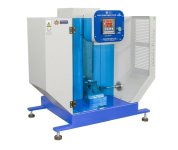prestogroup
Member

The Charpy and Izod impact tests are widely recognized methods for evaluating a material's toughness — its ability to absorb energy during sudden loading or impact without fracturing. These tests are essential in industries such as automotive, aerospace, construction, and manufacturing, where materials often face dynamic stresses in real-world applications.
Both methods involve striking a notched specimen with a swinging pendulum hammer and measuring the amount of energy absorbed during fracture. The difference lies mainly in specimen orientation and holding method :
- Charpy Impact Test – The specimen is supported horizontally between two anvils with the notch facing away from the pendulum. The hammer strikes the specimen opposite the notch, simulating a bending-type failure.
- Izod Impact Test – The specimen is clamped vertically with the notch facing the pendulum. The hammer strikes above the notch, producing a cantilever-type fracture.
Impact tests determine the material's toughness, ductility, and behavior under sudden loads, especially at different temperatures. They help identify whether a material will behave in a brittle or ductile manner under service conditions. This is particularly critical in applications like pipelines, structural components, and safety equipment where unexpected impact loads can occur.
Key Factors Affecting Results:
- Notch geometry – Ensures consistent stress concentration.
- Test temperature – Lower temperatures can increase brittleness.
- Material properties – Heat treatment, grain structure, and alloy composition affect toughness.
- Specimen size – Must conform to relevant standards like ASTM E23 or ISO 148.
- Quality control in manufacturing.
- Material selection for specific operating environments.
- Research and development for new alloys or composites.
- Failure analysis of broken components.
In conclusion, Charpy and Izod impact testing are indispensable tools for evaluating material toughness, ensuring that products meet safety, performance, and durability requirements in real-world conditions. Regular use of these tests aids in preventing material failures, optimizing design, and enhancing overall product reliability. Call us at +91 9210 903 903 or email info@prestogroup.com for expert guidance and a free quote.
